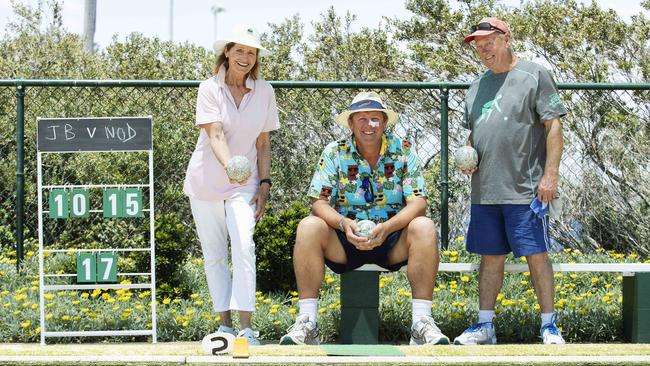Slug retirees, raise GST and tighten NDIS to get budget under control, says OECD
In its latest wide-ranging economic survey, the OECD is urging the Albanese government to shake down wealthy retirees, raise the pension age and bring back the mining tax.

The OECD is urging the Albanese government to slug wealthy Australians with higher taxes and rein in the spiralling cost of the uncapped National Disability Insurance Scheme to restore budget buffers in a rapidly ageing society.
Raising and broadening the GST would reduce the heavy income tax burden on workers and businesses, while removing tax breaks on superannuation would enhance equity between older and younger generations, boosting Canberra’s bottom line by $25bn a year, the Paris-based body said.
In its latest wide-ranging economic survey, released on Friday morning, the OECD said to pay for the burgeoning cost of aged care and health, ease the clean energy transition and spur economic growth, Australia should consider an inheritance and estate tax, raising the retirement age to 70, replacing state transfer duties with land taxes, and reviving a mining super-profits tax, which was repealed in 2014.
Reforms to the school curriculum, an employer focused skilled migration program and pre-merger notification to the competition watchdog would lead to a more dynamic and productive economy, it said.
The biennial survey cautions the Albanese government and Reserve Bank to hold their macroeconomic policy nerve, as “the economy is slowing amid tightening financial conditions, following a rapid post-pandemic recovery”.
Stripping out the cyclical effects of the boom in export prices, the federal budget was expected to be in deficit by around 1 per cent of gross domestic product or about $25bn this financial year.
“To bring inflation down, monetary policy will need to remain restrictive and further windfall government revenues from elevated commodity prices saved,” the survey said.
“Some fiscal tightening is warranted by unwinding temporary measures and narrowing the structural deficit.
“In the short term, such an approach would ensure fiscal policy is working in the same direction as monetary policy.”
As well, achieving the climate transition to net-zero emissions by 2050 will require “significant reforms”, including a more robust Safeguards Mechanism that applies to major emitters, higher fuel taxes and a rethink on existing fuel subsidies.
The OECD calls for bold action on both sides of the federal budget, warning governments not to build in permanent spending during times of strong returns on commodity exports, as well as a better fiscal dialogue with spendthrift states, whose debt levels have risen precipitously.
The survey canvasses a federal cap on spending, as in other countries, while channelling windfall tax gains to a new Future Fund-type vehicle to pay down public debt.
“Continuing to save windfalls from high commodity export earnings would contribute and help guard against Australia’s longstanding vulnerability to excessive fiscal expansion during commodity booms,” it said.
To support budget deficit reduction, the OECD calls for “tangible measures to slow growth in the costs of the NDIS”, which is responsible for one-sixth of the total growth in federal spending over four years, as more people than anticipated enter the scheme and fewer exit.
“Costs could well be significantly higher,” the OECD warned.
An agreement struck this year by the national cabinet, known as the Financial Sustainability Framework, aims to reduce spending growth from its current 14 per cent to 8 per cent by 2026-27.
“Achieving this outcome will require effective implementation of new cost containment measures that are yet to be announced but will be informed by a review of the scheme that is currently being undertaken,” the survey said.
The OECD acknowledges the political difficulty of raising more revenue from the GST, but says low-income families would be compensated for its regressive effects.
It notes the marked difference in the tax treatment of savings vehicles, with Australia having close to the highest marginal effective tax rate on bank deposits and rented residential property income in the OECD, while rates on retirement savings are well below average.
“These differences, combined with a high level of complexity in the various tax provisions, can encourage costly tax planning schemes and distort the flow of savings,” the survey said.
“The fact that older and higher income households have a relatively high share of assets in those savings vehicles more lightly taxed can exacerbate both intra- and intergenerational inequalities.”
It suggests the government should go further than its changes to raise the headline superannuation tax rate on earnings for balances in excess of $3m, which the OECD called for in its 2021 survey.
Treasury secretary Steven Kennedy recently pointed out only 18 per cent of Australians aged 65 and above pay income tax.
The OECD noted a 2017 review had considered a proposal, which was abandoned, of raising the retirement age to 70 by 2037 (it rose progressively to a terminal 67 on July 1).
“In future, linking increases in the pension age to some fraction of the increase in life expectancy of older Australians should be considered,” the survey said.
The OECD says more progress is needed to achieve gender equality, through better tax and welfare policies to boost women’s workforce participation, as well as more targeted and inclusive policies to close the gap for Indigenous health, education and wellbeing.
On a broader level, the survey noted “external forces loom large over Australia’s medium-term economic outlook”.
“As an economy that benefits significantly from foreign commodity demand, rising geopolitical tensions and global fragmentation are a risk to national income,” it said.







To join the conversation, please log in. Don't have an account? Register
Join the conversation, you are commenting as Logout